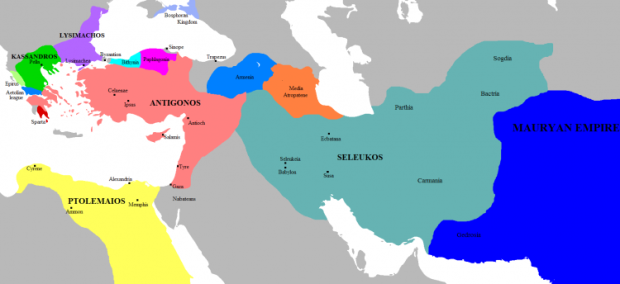One Mesopotamian who really understood how things work, was Berossos. Let me introduce you.
Meet Bel-re’ûshunu aka Berossos
Berossos is the Greek version of the Babylonian name Bel-re’ûshunu, “Bel is their shepherd”. The man does not appear once in the cuneiform documentation (though some contest this), but is quite widely attested in Greek, Latin and Armenian sources. He was a priest of Bel, but that does not mean that he had a cultic function – Assyriologists use the word “priest” to denote everyone who had been initiated to perform a job at the temple (from cultic functionaries to administrators and bakers and brewers). In modern terms we would consider him a scholar. In his work, Berossos himself claims that he was a contemporary of Alexander the Great (second part of 4th century BC). This means that he lived in a time when Babylonia was no longer independent, but part of the Seleucid empire.

The Seleucid Empire ca. 300 BC
Babyloniaca
Berossos, a Babylonian, priest of their Belos, who was born in the time of Alexander, composed the history of the Chaldaeans in three books for Antiochos, the third successor after him [Antiochos I Soter 281-261]. He set forth the events concerning their kings and relates … . Berossos is a most competent man. As proof of this, Juba who wrote on the Assyrians says that he learnt their history from Berossos. (Tatian, Address to the Greeks 36)
Berossos wrote a work about the history of Mesopotamia, which was probably titled “Babyloniaca”. We do not know this for sure, because Berossos’ work has not been handed down to us in its integral form. Instead, several classical authors cite him either directly or indirectly. Most recently, Geert De Breucker (Rijksuniversiteit Groningen) has puzzled together all those pieces into one work – or better, three books.
As mentioned above, Berossos’ Babyloniaca provided an overview of Mesopotamian history, from pre-deluvian times to his own present. The first book was a more general description of Mesopotamia’s peoples, customs and beliefs; for example: it tells how the Mesopotamians thought that the world was created. The second book was a history from pre-deluvian kings to Nabonassar; the third from Nabonassar to Alexander the Great.
However, what is most remarkable about Berossos’ work is that he wrote it in Greek. (This means that a Babylonian was competent enough to write an entire history in Greek!) What is more, Berossos dedicated his work to the Seleucid king Antiochos (I, 281-262 BC). It seems that with his Babyloniaca, he wanted to provide the Greek-speaking king and citizens with a history of Mesopotamia.
I shall now straightaway tell what is recorded and related among the Chaldaeans (i.e. Babylonians) about us. This is, also on other points, in considerable agreement with our writings. The witness of this is Berossos, a Chaldaean by birth, but famed among those who are engaged in learning, because he published for the Greeks works on astronomy and on the philosophy of the Chaldaeans. Now, this Berossos, following the most ancient records, gave an account of the flood and the destruction in it of mankind and of the ark in which Noah, the founder of our race, was saved, when it was carried to the heights of the Armenian mountains, just as Moses did. Then, he recounts the descendants of Noah and appending their dates, he comes to Nabopalassaros … (Josephus Flavius, Against Apion I , 128-131)
In antiquity some texts were attributed to Berossos that were not actually not written by him (what we call “pseudo-Berossos”). They are fragments concerning astronomy and astrology. There was in fact a whole tradition built around this pseudo-Berossos: he would have founded an astronomical school on Cos, would have been very famous in erudite circles, and would have been the father of a sybil. Very probably, all these things are fictitious and are due to the fact that the classical tradition considered astronomy as having originated in Babylonia and wanted to attribute it to a single person.
Berossos was not the only one who wanted to offer the Greeks a reliable history of his country in their native language. In Egypt, Manetho did the same with his Aegyptiaca. These men understood what it meant to live in a multicultural world.
Further reading
- De Breucker, Geert. De Babyloniaca van Berossos van Babylon: inleiding, editie en commentaar. Proefschrift aan de Rijksuniversiteit Groningen, 2012.
- De Breucker, Geert. “Berossos between Tradition and Innovation” in: The Oxford Handbook of Cuneiform Culture (Karen Radner & Eleanor Robson), Oxford 2011.
- Burstein, S.M. The Babyloniaca of Berossus. Malibu, 1980.
- Verbrugghe, G.P. & Wickersham, J.M. Berossos and Manetho, introduced and translated. Native traditions in ancient Mesopotamia and Egypt. Ann Arbos, 1996.
- http://referenceworks.brillonline.com/entries/brill-s-new-jacoby/berossos-of-babylon-680-a680?s.num=6
One thought on “Berossos: in between two cultures”